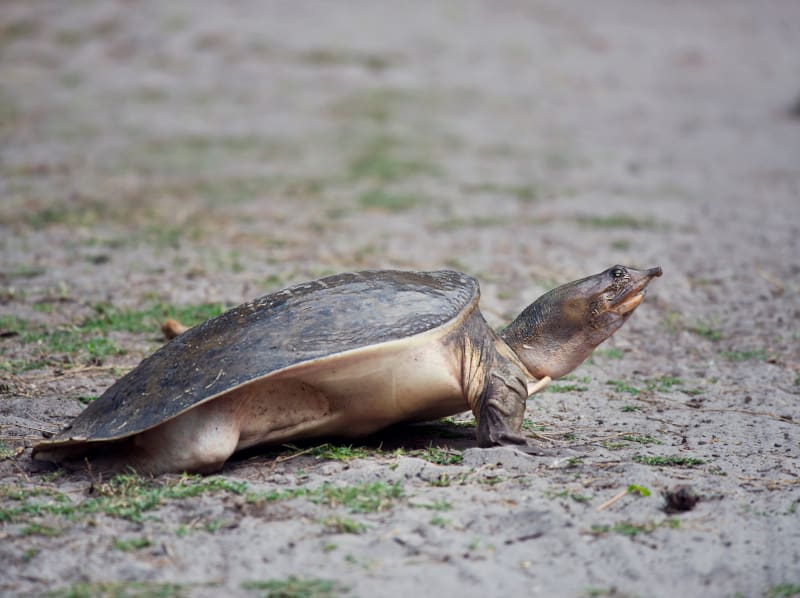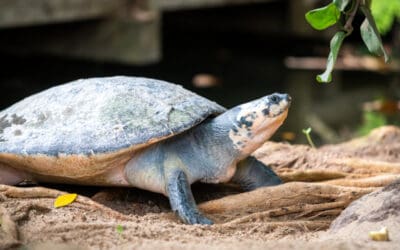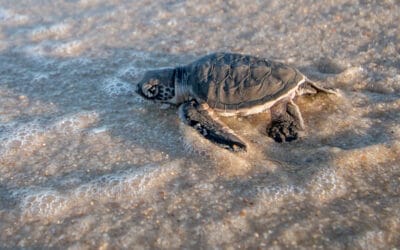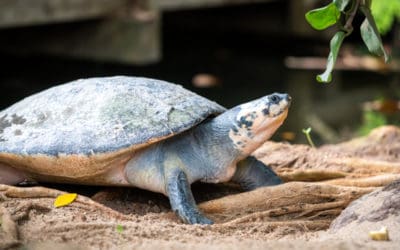My turtle laid eggs in the water, is it safe for baby turtles?
Laying eggs is a very serious thing for not only the turtle itself, but also for the owners. Usually, females lay eggs on land once they find the appropriate place, dig a hole to ensure safety of the eggs, and then carry on with their life. Basically, eggs can be fertilized or unfertilized and, just like in the case of chickens, some eggs can bring life and some don’t. So, even if your female turtle did not have contact with a male, it doesn’t mean that she will not be laying eggs.
But what to do if a turtle lays its eggs in the water? Well, if these are fertilized eggs, namely the ones where a baby turtle can grow, then you should go ahead and quickly recover the eggs from water. Turtles in these eggs will drown within a few minutes, so you don’t have any time to lose. Just make sure you do that as gently as possible, because freshly laid eggs are very fragile and can be easily crushed.
But what is the point of laying eggs in the water? How does the turtle do that if it is unsafe for the potential baby reptiles? Well, I know that you have quite a lot of questions related to the subject matter. Fortunately for you, I have been studying turtles for quite a long time. Together with that and my own personal knowledge and experience, I gathered quite a lot of information that can help you understand why turtles may lay eggs in the water and how to make sure that such a thing does not happen again.
Why do turtles lay eggs in the water?
Usually, these reptiles look for the appropriate place on land and dig a hole. There, they leave the eggs and cover it slightly, so it is protected by the predators. However, in some situations turtles may wait longer than they should if they feel like there is no appropriate place for egg laying. In such a situation, they will simply keep it inside until the place is found. If not, there are two potential outcomes:
- Keeping them even longer
- Releasing them into the water
The first option seems like a good option, right? Well, not really. I witnessed such a situation once or twice in my life as a turtle owner and sadly it wasn’t anything nice. You see, if turtles do not release the eggs in the recommended time period, they will suffer consequences. After a while, eggs start to rot. If they break inside the turtle’s body, they will infect the organism of the mother and, as a result, cause serious health issues to the turtle.
Such a situation, if not treated at all, will most likely lead to a life-threatening disease and, later on, it will cause the death of the turtle. Because of that, we should never lead to a situation where our reptile keeps its eggs in her body for too long. There are, luckily, special preparations and medications that can “persuade” the turtle to release the eggs without the sad consequences mentioned above.
The second outcome is not as bad as the first one and, if we are definitely not interested in keeping the baby turtles alive or we are perfectly aware that these eggs are not fertilized (a male turtle did not leave anything behind it), then laying eggs in the water is not that bad. Obviously, it is not ideal and it indicates problems with the way the habitat works and how it suits the needs of your turtle. Therefore, making sure that the eggs are not released into the water is definitely a very important thing to bear in mind.
Interestingly, females are capable of holding the male turtle’s sperm up to 3 to even 4 years, so even if your turtle did not have contact with males recently, it still can surprise us. Especially if this is the beginning of our journey with keeping a turtle as a pet.
How to make sure that my turtle does not do that again?
To make sure you prepare yourself for such a situation, you should learn the behavior of a pregnant turtle. And it means figuring out the symptoms of turtle pregnancy. There are several things to remember, but the most important ones are the following:
Change in the behavior
One of the first things that indicate that a female turtle is pregnant is the way it behaves. Normally, you don’t see a turtle ramming everything and trying to headbutt inanimate objects. Besides that, a pregnant turtle is usually filled with hormones and it may make your pet more aggressive than it usually is. Furthermore, we have to remember about the fact that in such situations, turtles may not be interested in seeing us, other people and animals, or anything else.
Change in the habits
If you see that your turtle does not want to eat at the time it would usually eat, then it is another sign that something is going on. However, the habit change does not mean food related issues only. Sometimes changing the habits mean very little or even no more sun basking, no more exploring the nooks and corners of the tank, and some other things that your turtle used to do before.
The eggs
One of the most obvious things you can do is touch your turtle in the bottom part of the belly and see if you feel the eggs. You don’t have to press it or make any force on the belly. Simply put your finger at it and move. If you see any disturbances under the finger, then most likely you are dealing with a pregnant turtle. The best way to figure out whether you are doing it right is to compare it with a non-pregnant turtle, preferably a male.

Here are some important things to remember when setting up the right habitat for laying eggs
The first thing you have to do is to make sure that your turtle has the appropriate amount of space and soil that is deep enough for a turtle to dig a hole without worrying about the ground. Besides that, you have to remember that in the wilderness, turtles usually go on the beach to lay their eggs. So, imitating the ideal egg laying habitat might be a very good idea.
Needless to say, you have to keep the right temperature in the tank. To make sure that the eggs will hatch successfully, you can also look for special turtle incubators. They significantly increase the chances for hatching the turtle. Also, turtles like to pick well-drained, open areas where there are no stones, branches, or other objects that could interrupt a turtle while digging a hole at the appropriate level.
Now you know why your turtle laid eggs in the water
Though it is not the end of the world, turtles should not lay their eggs in the water. In the wild, they usually go onto the beach and look for a safe space that will be free from rocks, branches, or other objects that would endanger the place. Obviously, we have to remember that in order to make a tank appropriate, you have to set the environment to be as realistic as it possibly can be. It means that you have to place enough sand without rocks, branches, and other objects, so a turtle can excavate without any troubles. It also means adjusting the temperature and ensuring there is enough peace around the tank that your turtle will not be bothered.
If you happen to see a turtle laid eggs in the water, then you have only a few minutes to save the potential babies. These reptiles can keep a male sperm even for 3 years in their organism, so if you own a female turtle for a shorter period, then there is a possibility that even if there are no male turtles inside the tank, your animal may still have laid fertilized eggs.
Submit your review | |

















